A Grave for Two Read online
Page 23
Elise hadn’t thought too deeply about the fact that Haakon was suddenly walking around with a double set of both one thing and another.
It dawned on her that she should have done. Especially because he had tried to hide the new phone from her. She had come across him when he was opening the package, and he had jumped out of his skin. Pushed the whole shebang under a settee cushion.
The kettle whistled loudly. She took it off the hotplate and half-filled the cafetiere. She stirred the mixture with a spoon and replaced the lid.
The strangest thing, and the one that should have made her react, was that he had never switched over from the old to the new device. She herself could hardly wait each time she had a new phone. It could take more than an hour to transfer all the data, apps and games, but she always did it at the first opportunity.
And then laid aside the old phone, usually never more to use it.
They had a whole drawer full of them.
Haakon continued to use everything. Both mobiles, and both laptops. The older phone had been lying in his car and was now with the police. She hadn’t even given a thought to the latest acquisitions until last night, for want of something to do and refusing to take the damned sleeping pills, she had started to tidy up. Clean. Vacuum. Sort out Haakon’s things. No iPhone X or brand new MacBook had turned up anywhere.
Only the old laptop, which was in a drawer in the guest bedroom.
He had reset the machine. To the factory settings. It was empty. No notes, no mailboxes. No photographs, just as she had taught him to do when you no longer intended to use a device.
Maybe the new one was for himself after all. Elise felt a trace of relief, a sensation that left her as quickly as it had come. Something might have been wrong with it. That had happened before, when he had acquired an obstinate virus, and Elise had shown him how thoroughly he had to proceed in order to get rid of the atrocity.
She pressed down the plunger in the jug and poured some coffee into a Liverpool FC mug. Grasping it with her hand through the handle, she shuffled out into the living room. She sat down on the settee, so listlessly that she spilled some coffee. Without bothering about it at all.
And then the iPad occurred to her.
That wasn’t new either. Probably five years old. Haakon used it mainly to watch films when he was travelling. Sluggishly, as he had reluctantly admitted earlier that autumn, and Elise had already bought him a 12.9-inch Pro edition that he was due to receive as a Christmas present from William. The thought made her eyes well up with tears again, but she straightened her neck, gritted her teeth and refused to cry.
Haakon was dreadful with IT. He didn’t even have a mailbox on his phone. Not on his iPad either – in his opinion the world contained enough intrusions and he didn’t want to have to answer emails from all over the place. Of course he could have used a computer, and he was a whizz at Excel. He used the program for his training diary. When it came to setting up the machines, on the other hand, she had to help him sometimes, and always make a fuss about passwords and security. It was as if he didn’t quite understand the potential consequences of being lazy about safeguarding data. He had no secrets, he usually declared when she nagged at him, and then shrugged his shoulders.
However, Haakon was well versed in the Find My iPhone function. With so much time on the move, constantly changing hotel rooms and trips in other people’s cars, he often had to use it.
Elise put down her mug of coffee and fetched the iPad from his bedside table.
Selma Falck had thought Haakon couldn’t possibly be unfaithful, that the life of a national team skier was too transparent. But what did Selma know about it? His existence had not been more open to others than that he had been able to do some double-entry book-keeping on the tech front for days on end without Elise giving it a second thought.
Selma might be wrong.
Not knowing was intolerable.
She stared at the black display, covered in fingermarks and stains of something that might be William’s breakfast porridge. It was difficult to imagine that Haakon had bought new equipment without registering it. And initiating the ‘find’ function, which he had previously needed to use on several occasions. A couple of keystrokes on Haakon’s iPad might well tell her what had happened to the two vanished machines.
Whether she really wanted to know was a different question altogether.
She had sometimes used his iPad. She used the tablet primarily to keep William amused. Haakon had downloaded a number of games for young children. William especially liked an aquarium with colourful fish. He could feed them until they burst and turned into angels with fins and gills. Haakon had never objected or expressed any form of disgruntlement when she had openly picked up his iPad.
He had always, until the last few days of his life, shown her limitless trust. All the same, or maybe precisely because of this, it felt slightly criminal when she grabbed the iPad, switched it on and opened Safari. Only a few seconds later she had gained access to Find My iPhone.
Haakon used the most ridiculous codes, and she often had to nag at him for weeks on end before he locked his devices. This past year he had used the password OL2018.
She keyed in the code.
A map of Oslo appeared in the top half of the display. The lower half comprised a list of Haakon’s devices. The machine in the guest room was gone. The iPhone X was on the list, simply entered as iPhone X, but it wasn’t visible on the map. The list also included several names, but they were both disconnected and invisible on the map. Probably these were old devices that had died a long time ago and were now lying in the drawer in the storeroom.
Haakon4’s iPhone was situated in Grønlandsleiret 44, the display told her.
At the police station. He wasn’t betraying delusions of royalty by attaching the number 4 to his name, but had included the model number.
That this phone was shown on the map meant that it was switched on and in contact with a network.
The police were examining Haakon’s phone at this very moment.
Tears filled her eyes again.
Haakon’s iPad was the one she was holding in her hand. On the map it was shown as a pulsing, pale-blue circle.
The new laptop also appeared on the map. She did not recognize the address, somewhere in the north-east of the city. She used two thumbs to zoom right in.
Stølsvegen. Årvoll.
She made the map move even closer. Registered the street number. Grabbing her own phone, she located the phone directory, and tapped in the address she had just found.
It took a few seconds before she understood it all.
Selma had been mistaken.
Elise was the one who was right.
Time stood still when she saw who lived in Stølsvegen. She knew the man well. She knew his daughter even better. Sophie was twenty-two years of age, danced in the youth wing of the National Ballet, and was the most beautiful woman Haakon knew. He had admitted as much one evening in April, at the close of the season, but before summer training had started in earnest.
They had been at a barbecue at a friend’s house, and Haakon had drunk a couple of beers too many. He wasn’t used to drinking. For eleven months of the year he didn’t touch alcohol at all, and when the boys had embarked on a silly party game, she and the other women had finally made themselves scarce. William hadn’t yet turned one. Elise’s mother had phoned about eleven p.m. to say that the little boy had a temperature. Elise had gone searching for Haakon to tell him she was going home. As she approached the group of lads at the bottom of the garden, beside a trampoline on which they had just tried to outdo one another, she had heard it. Haakon was standing with his back to her and his words were slurred. He was waving a beer can, holding on to the trampoline, as he loudly declared that Sophie Selhus was the most attractive woman in the whole of Norway, and that he would cut off his right hand for a night with her.
His pals had laughed and shrieked, and none of them had noticed Elise. She turned on h
er heel and went home to a baby who developed terrible feverish convulsions in the course of the night. Elise had never been so scared before, and took him to A&E with her mother. William was cooled down, given diazepam, and the convulsions disappeared. When Haakon, pale and hungover, woke the next day just as Elise and their son returned from the hospital, he obviously remembered none of it.
Elise had also made up her mind to forget it.
Sophie Selhus, the graceful, brown-eyed daughter of the NCCSF’s Finance Director, had been given a brand new MacBook as a present from Haakon. He had even set it up for her. Elise could not think of any other explanation for him having unpacked it and kept it here at home for a few days.
She had not lost her man in an accident last Friday. She had lost him to a dark-haired ballet dancer from Årvoll, God only knew how long ago.
The thought was unbearable.
REPORTED MISSING
It was as if the apartment in Pilestredet had faded.
A fine layer of dust covered everything. Vanja normally complained about it: the only disadvantage of living in such a central location, just beside the roundabout in Bislett, was all the dust. Since Kristina had allergies, they allowed themselves the luxury of having a cleaner in twice a week. The woman had now been laid off for an indeterminate period.
Scattered here and there were empty bottles no one had gone to the bother of removing. Coffee cups. Two stemmed glasses adorned the window ledge, with dried red wine dregs at the bottom. Beside the front door lay a pile of newspapers that seemed unread. Selma could hear P2 playing on a radio in an antique corner cupboard. A documentary about the significance of the placenta, as far as she could make out.
However, she didn’t have enough energy to feel inquisitive.
If the countless bouquets of flowers hadn’t really started to fade, their scent had become so cloying that Selma felt slightly nauseous.
‘Kristina’s sleeping,’ Vanja said in a monotone, pointing at the purple velour settee.
Selma had already been here for a few minutes without them having exchanged a single word. She sat down. Opened the bottle of Pepsi Max she had brought with her and drank one-third of the contents.
‘Good for her,’ she said.
‘She can’t sleep at night. Collapses in the middle of the day. Then evening comes, and we’re no further forward.’
‘You just have to give it time.’
‘Time? Honestly, Selma. If you’ve come here to throw around some clichés, then you might as well go again.’
Selma raised her palms in a placatory gesture and lowered her head.
‘Just wanted to see how things were going,’ she said quietly.
‘Today’s news can’t have been much fun for either of you.’
Vanja hadn’t taken a seat. Until now she’d been moving haphazardly here and there, stopping to touch something or other, before listlessly meandering onwards. Now she came to a sudden halt. Fixing her eyes on Selma, she said: ‘Bottolf says he gave notification of the drugs test on Monday. To you. That he came here during the viewing, and you promised to let us know. What happened?’
Selma put the bottle down on the coffee table, placed her hands on her lap and looked up.
‘What would have been the point of that? Spoiling the wake? You had a beautiful moment here, Vanja. A quiet, respectful occasion in the company of good friends. And if life has taught me anything, it’s not to inflict unnecessary problems and worries on other people. You would get to know about it soon enough all the same. I had hoped that the drugs test wouldn’t become public knowledge before the funeral, so that it would be over and done with without too much unnecessary fuss. It didn’t turn out that way.’
She used her hand to rub her nose and then tuck her hair behind her ear.
‘What you don’t know can’t harm you. And you were already suffering enough.’
Vanja did not answer.
‘Do you understand?’ Selma asked.
‘Haakon was killed,’ Vanja said.
‘We don’t know that for sure.’
‘Yes, he was. I can feel it in my bones. I’ve felt it ever since Friday night, when the police and that dreadful clergyman turned up here, I’ve felt it deep within my mother’s soul. It wasn’t like Haakon to be so careless, it was …’
She supported herself on a capacious winged armchair. All of a sudden, she covered her mouth and nose with her hand and sobbed.
‘He was murdered. I just know he was.’
Selma was at a loss for anything to say. Of course there was every reason to take a closer look at the images on the wild-life camera, something the police had initiated some time ago. However, she had watched the film clip over and over again, most recently this morning on her own mobile phone, and there was absolutely no basis for claiming that any collision had actually occurred. DG had not published the live images on the internet, as that would probably antagonize the police too much. All the same, they had taken the risk of issuing a still image. It showed so little that their only intention must have been to demonstrate that DG was in possession of better material than any of the others. The car was just a dark, maybe reddish, shadow, and the skier could be anyone at all.
‘It could of course have been an accident,’ Selma finally said. ‘But right now it might be better to concentrate on …’
She looked around. It could really do with a spring clean in here.
‘… the funeral,’ she concluded.
‘He was deliberately knocked down,’ Vanja said defiantly. ‘Haakon was born with a phenomenal sense of balance. Which was subsequently honed to perfection. He would never have been run into the ditch just by a passing car.’
Selma tried to bite her tongue. She was here simply out of duty. She could leave now, since she had already shown a commensurate amount of sympathy.
‘Who would be interested in killing Haakon?’ she asked instead, with a touch of resignation.
‘A Swede, for example. Sven Feldin. He’s always been critical of Haakon. Jealous. The year before last, when Haakon published his entire training diary online, he claimed it was a fake. That it was impossible to train so much without doing yourself any damage. That it wouldn’t improve your performance.’
‘Sven Feldin was in Davos last Friday,’ Selma said, with a loud sigh. ‘He took part in a World Cup race on Saturday.’
‘He could have got someone to do it for him.’
Getting to her feet, Selma grabbed the bottle of Pepsi Max and stood twisting it round and round in her hands.
‘So Sven Feldin, Sweden’s best cross-country skier, paid a hired killer who drove up to Maridalen in a car one chilly Friday night in December, just four days after it emerged that Haakon wasn’t able to travel to Davos because of a minor shoulder injury, and …’
She paused and glanced up. Vanja was sobbing silently.
‘… and knocked Haakon down and killed him?’ she said in conclusion.
‘If not him, then it could have been someone else. A Russian. Or a German.’
Now she was in floods of tears. Her head was bowed, her shoulders hunched. Her hair was greasy, Selma noticed, and was hanging lank on her shoulders. The lilac-coloured garments, layer upon layer to hide the fact that Vanja had steadily put on weight after her career as a handball player was over, made her resemble a withered hydrangea.
Selma approached her. Vanja willingly accepted her embrace: she put her hands around the small of Selma’s back and hugged her as she pushed her face into the crook of her neck.
‘He’s dead,’ she sobbed. ‘I don’t know how I’ll ever get over this.’
Selma did not reply. Just held her tight. Let herself be hugged, listened to Vanja’s weeping mixed with the occasional word she could not make out. The tram jangled at the roundabout. A driver blasted his horn. The placenta programme on the radio was finished, and Selma still stood there, holding her old friend, someone she had known since primary school.
‘I have to go now,’ she whispere
d, gingerly trying to loosen her grip.
‘No. No! Please. Stay until Kristina wakes up.’
Selma grew dizzy. From the unaccustomed physical touch. From the smells, both the scent of the flowers and the slightly rancid odour of greasy hair and stale perfume. She planted her feet further apart.
The news roundup came on the radio over in the corner.
#MeToo was the top story. Several complaints had been made about the behaviour of the Labour Party’s Deputy Leader. In addition, a Conservative Party MP was on the offensive about public money being spent on attendance allowance for the parents of gravely ill children. In the north of Norway, the Chair of Helse Nord, the health board, felt personally threatened in a conflict about the location of a new cardio-clinic.
The world-famous photographer, Norwegian Morten Karlshaug, has been reported missing.
Selma now tried in earnest to release herself from Vanja’s embrace.
Vanja was reluctant to let go. Selma tilted her head to hear the radio more clearly.
He was last seen in his home on 2 December this year. The following day, he intended to travel to a photo assignment in Mongolia, which is, according to the police, the probable reason for him not being reported missing until now. Karlshaug is mainly known for his landscape photography and he has had a number of photo reportages published in the well-respected National Geographic journal. Information about the case should be reported to the nearest police station.
‘I have to go now,’ Selma said softly but firmly.
She released Vanja’s grip and took a step back.
‘Phone me if you need me to come over.’
‘I need you to be here now.’
‘I can’t, Vanja. But I could come tomorrow. I’ll try. I promise. Now I have to go.’

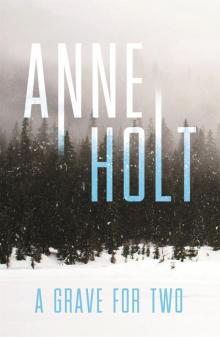 A Grave for Two
A Grave for Two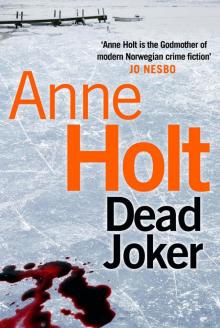 Dead Joker
Dead Joker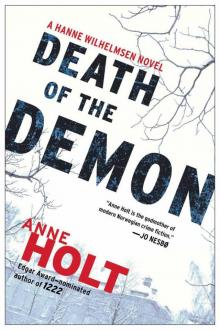 Death of the Demon: A Hanne Wilhelmsen Novel
Death of the Demon: A Hanne Wilhelmsen Novel Punishment aka What Is Mine
Punishment aka What Is Mine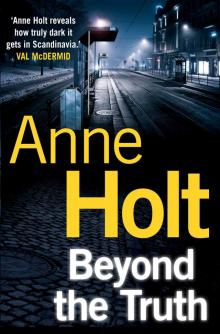 Beyond the Truth
Beyond the Truth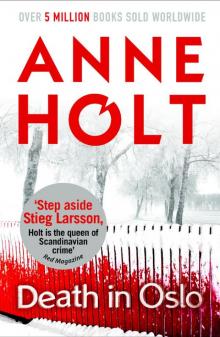 Death in Oslo
Death in Oslo The Blind Goddess
The Blind Goddess What Never Happens
What Never Happens 1222
1222 In Dust and Ashes
In Dust and Ashes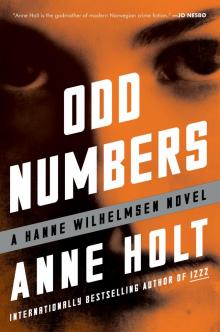 Odd Numbers
Odd Numbers What is Mine
What is Mine What Dark Clouds Hide
What Dark Clouds Hide Blessed Are Those Who Thirst
Blessed Are Those Who Thirst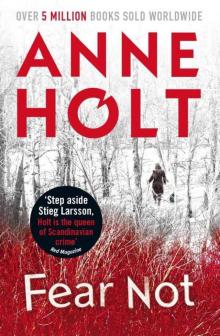 Fear Not
Fear Not No Echo
No Echo Hanne Wilhelmsen - 01 - The Blind Goddess
Hanne Wilhelmsen - 01 - The Blind Goddess